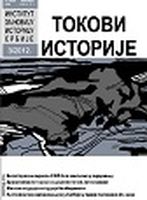„У сваком Бугарину имали смо оца, а у Бугарки мајку”. Југословенска деца у Бугарској 1945. године
„Every Bulgarian Man Was Our Father and Every Bulgarian Woman Our Mother”. Yugoslav Children in Bulgaria in 1945
Author(s): Sanja Petrović TodosijevićSubject(s): History
Published by: Institut za noviju istoriju Srbije
Keywords: Yugoslavia, Bulgaria, children, Second World War, children’s homes; Bulgarian Homeland Front Central Commission for Youth (Centralna mladeška komisija Otačestvenog fronta Bugarske); USAOJ; Ministry of Social Policy of DFY – Depart
Summary/Abstract: A drive to provide care for about 12 000 Yugoslav boys and girls in Bulgaria in 1945 was organized to arrange temporary care for children whose parents fought in NOV (People’s Liberation Army) and POJ (Partisan Detachments of Yugoslavia), children victims of Fascist terror and socially vulnerable children. It was part of a large initiative of the new Yugoslav state named Drive to Send Children to Children’s Homes in Bulgaria, Children’s Groups Homes and Concentrated Children’s Communities in Banat. The drive to provide shelter and care for Yugoslav children in Bulgaria took place from the middle of January up to the middle of October 1945 when most Yugoslav children returned home from Bulgaria. The drive to temporarily provide care for Yugoslav children in Bulgaria can be seen in the light of redefining YugoslavBulgarian relations in autumn of 1944 culminating on November 27 1947 with the signing of a Treaty of Friendship, Co-operation and Mutual Assistance between Yugoslavia and Bulgaria. Analysis of one of the most important drives undertaken in the field of social protection by the new Yugoslav state shows: that the new Yugoslav regime was faced with serious social problems, that although it had moderate state capacities at its disposal it had mechanisms that the social services could use in order to partially alleviate the severe consequences of war and survive the first days of peace. The drive to provide care for Yugoslav children in Bulgaria encountered many problems that could not have been foreseen. Although food, accommodation and treatment of children in Bulgaria was evaluated as adequate, writers of numerous reports on the state of Yugoslav children’s homes in Bulgaria drew attention to the difficult financial position of the Yugoslav personnel in Bulgaria, incompetence and superficiality at work which were direct consequences of one of the largest problems the Yugoslav state was facing, that is, the issue of personnel, the bad or non existent communication between parents and children due to communications and postal services breakdown. However, the possibility to at least temporarily relocate from Yugoslavia, where the war was still fought when the they left the country, was the only hope for survival for many of the children because among them were those who had lost everyone and everything in the war.
Journal: Tokovi istorije
- Issue Year: 2013
- Issue No: 3
- Page Range: 173-206
- Page Count: 34
- Language: Serbian

